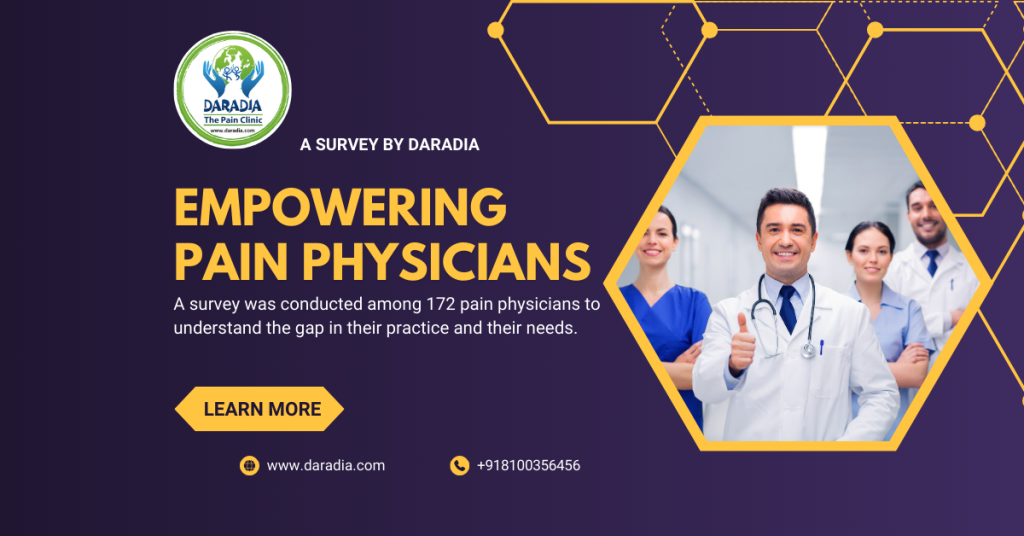Unlocking the Future of Pain Management: Insights from a Global Survey of Pain Physicians
Introduction
Pain management is a growing yet challenging field, requiring physicians to constantly balance clinical expertise with practice management and patient engagement. To better understand the barriers faced by pain physicians worldwide, a comprehensive survey conducted among affiliates of Daradia Pain Clinic sheds light on the challenges, resource gaps, and solutions for advancing pain care.
This blog explores the key findings from the survey and highlights actionable strategies to empower pain physicians globally.
The Challenges in Pain Management
Pain management physicians often encounter hurdles that hinder their professional growth and patient care. The survey revealed three primary challenges:
- Skill Deficiency:
A striking 80% of respondents reported lacking advanced interventional skills. As pain medicine evolves, physicians need expertise in techniques like ultrasound-guided interventions and radiofrequency ablation. Yet, access to training in these areas remains limited in many regions. - Limited Patient Awareness:
Over 60% of pain physicians cited poor patient awareness as a significant obstacle. Many individuals suffer in silence, unaware of available pain management options. - Financial Constraints:
Starting or expanding a pain management practice often requires significant investment in high-quality equipment and facilities. Nearly 40% of respondents identified financial barriers as a limiting factor.
What Pain Physicians Need to Succeed
The survey not only identified challenges but also explored what pain physicians believe could help them thrive. Here are the top needs:
1. Regular CME Programs
Physicians emphasized the importance of continuing medical education (CME) to stay updated on the latest advancements. Online CME programs are particularly valued for their accessibility and convenience.
2. Mentorship and Case Discussions
About 65% of respondents expressed the need for mentorship and peer-reviewed discussions. Collaborative learning through case reviews can bridge knowledge gaps and build confidence in managing complex cases.
3. Patient Education Tools
Half of the respondents pointed to the need for patient education resources like pamphlets and videos. These tools can help raise awareness about pain management, encouraging patients to seek timely care.
4. Financial and Marketing Support
Pain physicians also highlighted the importance of guidance in optimizing their practices, including tips on financial planning and marketing strategies. Such support could enable them to overcome barriers to growth.
How Institutions Can Help
Educational institutions like Daradia Pain Clinic are well-positioned to address these needs. Here’s how they can make a difference:
- Skill Enhancement Workshops: Hands-on training sessions, regional workshops, and advanced interventional pain management courses can help practitioners gain the necessary skills.
- Mentorship Platforms: Virtual platforms that connect senior experts with early-career physicians can provide on-demand guidance.
- Public Awareness Campaigns: Collaborating with physicians to create patient education materials can help demystify pain management and attract more patients.
- Financial Assistance: Partnering with medical equipment providers to offer discounts or financial aid can help physicians establish their practices.
Why Patient Education Matters
One of the key takeaways from the survey is the urgent need for better patient awareness. Physicians noted that when patients understand pain management options, they are more likely to seek treatment. Educational campaigns, online resources, and community workshops can close this gap, ensuring that no one suffers unnecessarily.
Region-Specific Solutions
The challenges faced by pain physicians vary across regions. In low- and middle-income countries, financial constraints and resource shortages are more pronounced. Institutions can address this by:
- Establishing regional training hubs.
- Offering low-cost or subsidized training programs.
- Partnering with local organizations to provide equipment and materials.
Building a Brighter Future in Pain Management
The insights from this survey provide a roadmap for advancing pain medicine globally. By addressing skill gaps, improving patient awareness, and providing tailored institutional support, we can empower pain physicians to deliver better care and grow their practices.
At Daradia Pain Clinic, we are committed to supporting pain physicians through education, mentorship, and innovative resources. Together, we can shape a future where pain management is accessible, effective, and compassionate.
Call to Action
Are you a pain management physician looking to enhance your skills and grow your practice? Explore Daradia’s range of courses, mentorship programs, and CME opportunities. Join a global network of pain specialists dedicated to making a difference.

